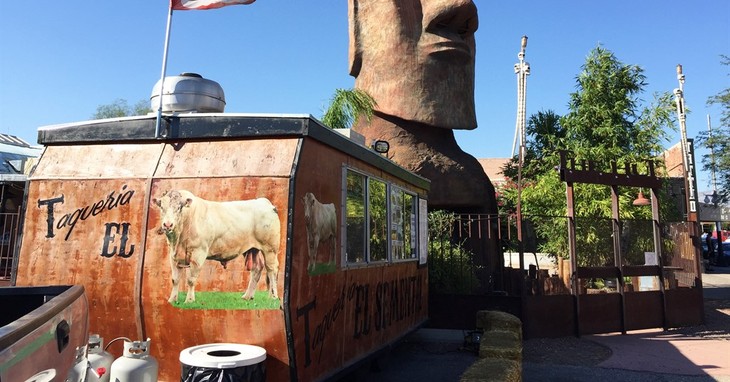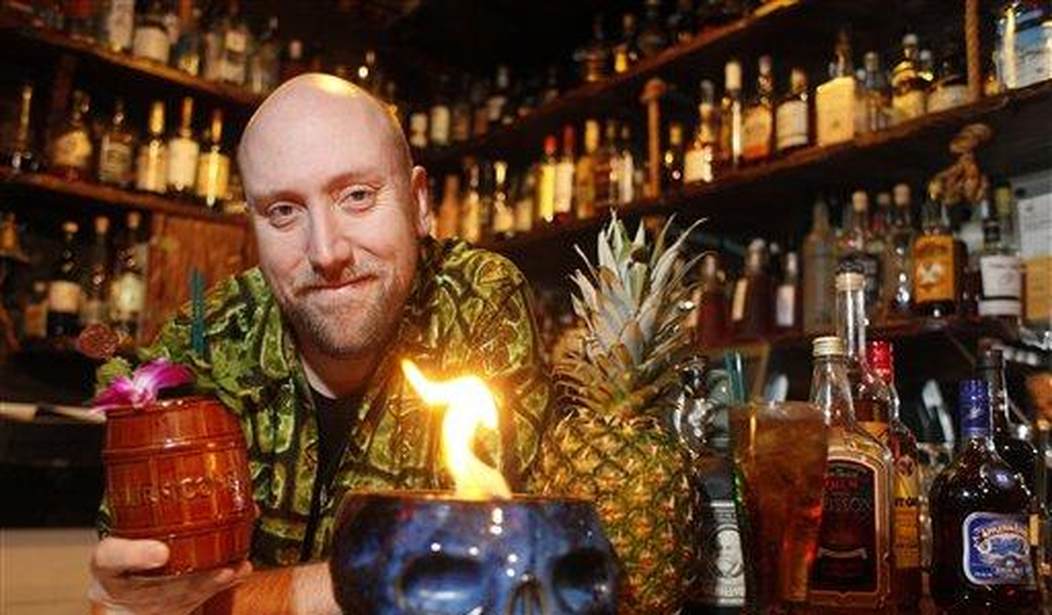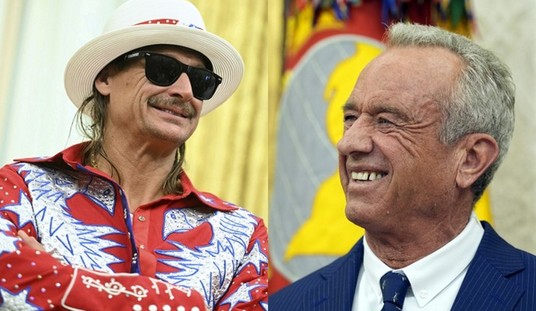Something this fun and enjoyable MUST be offensive. (Lack of outrage not a factor)
It was a lengthy example of hand-wringing that, thankfully, was largely overlooked during the holiday session. The New York Times issued a lengthy treatise of all that is wrong with tiki bars and the affiliated tiki culture. As one might guess, it has to do with the racial problematics and the assumed crime of cultural appropriation, but even as this is delivered in a somber tone of seriousness one thing is apparent; the pearl-clutching authors are rather oblivious to the details.
Pour yourself a stiff multi-rum drink – this is a migraine-inducing farce.
The subheadline delivers the tone: Tiki bars are a beverage industry mainstay with a painful and under-examined past. Can the format be repaired? This is the tone of those who have recently discovered something and have begun their own exploration into a nebulous culture. In truth tiki culture is hardly unexamined – it is very definable and rather well known.
While invoking imagery from far away lands, what we regard as tiki culture in this country is a distinctly American enterprise. It began well before the article’s claims. Things first emerged in the 1800s, and decades later bloomed with American servicemen staged in the Pacific becoming enamored with the vistas and people they encountered. The early 1900s had numerous books published about the tropical Edens, including writings from Herman Melville. These tomes were so popular that when a satire edition was published mocking the movement, – The Cruise of the Kawa – it was accepted as a truthful account, and the author was invited to speak to the National Geographic Society.
This underscores the ersatz nature and heavily fictional component of Polynesian pop. It is not stealing another’s culture, it is largely the fabrication of a varied collection of touchstones by creating new aspects based on wide influences. So much of tiki culture is entirely invented rather than lifted that pinpointing origins becomes a frustrating practice for the serious-minded critics. They claim things were stolen, but they are at a loss to say from whom.
The Times piece, written by the very un-Polynesian sounding Sammi Katz and Olivia McGiff, points to the launch of a pair of iconic restaurants in the 1930s which are revered in the tiki culture — Don The Beachcomber, and Trader Vic’s. In describing what these island institutions delivered you get the melting pot concept. ‘’They took rum from the Caribbean, food from Asia, and iconography from the Pacific islands, put ‘em all in a shaker, strained the results and called it Tiki.’’
The writers gloss over the fact that a number of continents and numerous countries are involved at this point. Already you have a problem pinning down who exactly is seeing their culture appropriated. Exactly is never an issue; it is all racially problematic, including the fact that rum was used because it was made cheaply with slave labor.
But did they really call it that? While ‘tiki’’ as a term then was known it was not the label we know of it today. That did not take place until the early 1950s, when the archaeologist Thor Heyerdahl published his book, ‘’The Kon-Tiki’’, and then his subsequent Oscar-winning documentary. He documented his trip using ancient ship building methods to sail from the Easter Islands to the far off Polynesian islands. From there, tiki culture went from popular to a true frenzy in the country.
The writers further display obliviousness with this passage. ‘’In 1960 when the Mai-Kai, a tiki restaurant in Florida, sold 10,000 “Mystery Drinks” presented by half-dressed “Mystery Girls,” the U.S. military was using the Pacific Islands to test nuclear bombs.’’ Uh, yes – we know all about that. Those female servers frequently wore bikinis, the daring swimsuit named after the Bikini Atoll where those bomb tests were conducted. This is a long-established cultural item, but to the Times this is a surprising bit of triggering history.

Next, the writers spoke to a number of activist workers in the service industry, who are ‘’looking to shed the appropriation and racism that have accompanied tiki since its inception.’’ Of note here is that the writers have yet to establish any firm examples of appropriation or racism, but it is declared as a given.
Their first expert is actually someone who raves about tiki culture, never invoking a problem and concluding that tiki cocktails are a, “deeply considered, well-executed, high production value cocktail experience.” Well, that does little to make us hate this intolerant practice!
Their next expert says of Polynesia, ‘’It has higher rates of poverty, lack of access to essential services and more burden from climate change.” How exactly are any of those problems addressed in any fashion to the existence or removal of tiki bars? No explanation is given. But we do see the challenge in the appropriation charges. This same source is a person indigenous to Guam, and they promote the idea of dispensing with the term ‘’tiki’’ and instead using ‘’tropical’’.
The issue – ‘’tiki’’ is a term that originated in the Easter islands, a full hemisphere away from Guam. This was the intent of Thor Heyerdahl’s boat journey. He noted how islands that were remarkably separated across the ocean contained similar styles of statuary, and he established it was in fact provable that they journeyed by boat across great distances. So Polynesian culture itself is difficult to pin down, and as Americans incorporated styles from across the globe to create wholly original imagery it becomes near impossible to stipulate who exactly should be offended.
Another restauranteur delivered an unclear intonation. “To go into a bar and see mostly white guys in Hawaiian shirts presenting this fetishization of a culture when the people of that country can’t even escape what’s happening to them. That’s dark.” Okay, question – which country? Hawaii is a US state. If he is referring to the other decor notes in restaurants — as we established — those comprise items either from numerous countries or, more likely, were completely fabricated and are not genuine articles from any nation.
This article by The Times proves out what is so commonplace with the charges of racism and cultural appropriation. They can only claim the offense because something feels wrong. Evidence is not nearly as important as sounding serious and concerned. How are they assigning cultural crimes when most elements were created entirely by and for those enjoying the practice? It is becoming evident that racial problems are trending close to that infamous judgment about pornography; they cannot tell us specifically what is racist, they just know it when they see it.
Tiki bars represent everything our nation was designed to accomplish; taking in various cultures and assimilating them into our collective consciousness, then modifying them in many unique fashions to make them our own. Put another way, tiki bars are truly and entirely an American cultural item — which is probably the very reason a segment of the country wants to find a problem with them today.















Join the conversation as a VIP Member